Related Research Articles

Bitola is a city in the southwestern part of North Macedonia. It is located in the southern part of the Pelagonia valley, surrounded by the Baba, Nidže, and Kajmakčalan mountain ranges, 14 kilometres north of the Medžitlija-Níki border crossing with Greece. The city stands at an important junction connecting the south of the Adriatic Sea region with the Aegean Sea and Central Europe, and it is an administrative, cultural, industrial, commercial, and educational centre. It has been known since the Ottoman period as the "City of Consuls", since many European countries had consulates in Bitola.

The Macedonian Struggle was a series of social, political, cultural and military conflicts that were mainly fought between Greek and Bulgarian subjects who lived in Ottoman Macedonia between 1893 and 1912. The conflict was part of a wider rebel war in which revolutionary organizations of Greeks, Bulgarians and Serbs all fought over Macedonia. Gradually the Greek and Bulgarian bands gained the upper hand. Though the conflict was largely pacified by the Young Turk Revolution, it remained a low intensity insurgency until the Balkan Wars.

The Serbs are one of the constitutional ethnic groups of North Macedonia, numbering about 24,000 inhabitants.
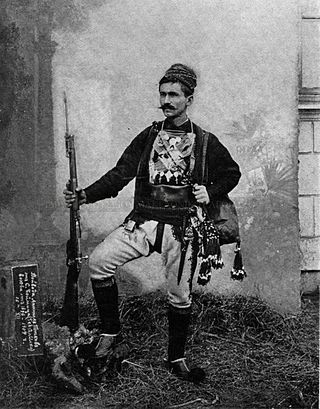
Apostol Petkov Terziev was a Macedonian Bulgarian revolutionary and one of the leaders of the national liberation movement in Ottoman Macedonia. He was a leading Komitadji in the armed units of the Bulgarian Macedonian-Adrianople Revolutionary Committees and later participated in the Bulgarian People's Macedonian-Adrianople Revolutionary Organization. He took part in the battles against the Ottoman authorities in the Ilinden-Preobrazhenie Uprising and Macedonian Struggle. Historians from North Macedonia consider him an ethnic Macedonian historical figure.
The Battle of Valtetsi was fought on 24 May (N.S.), 1821 in Valtetsi between the Ottoman army and Greek revolutionaries.

Kiril Parlichev was a Bulgarian revolutionary and public figure. He was a member of Internal Macedono-Adrianopolean Revolutionary Organization (IMARO) and a popular teacher, journalist, translator and writer.
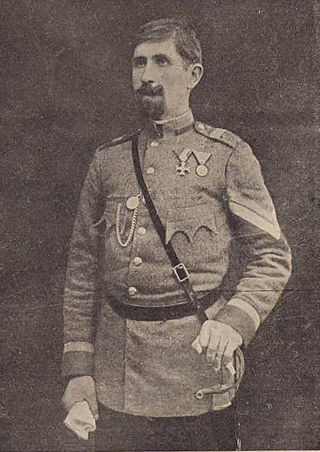
Dimitar Andonov was a Bulgarian officer and revolutionary, a leader of an Internal Macedonian-Adrianople Revolutionary Organization (IMARO) revolutionary band for the Prilep region.
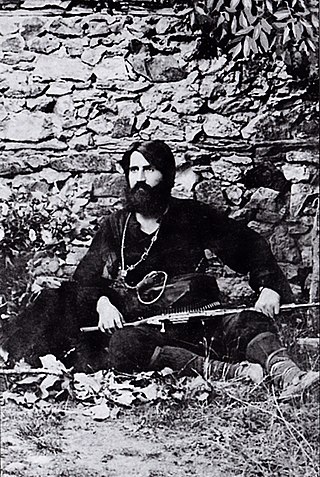
Petar Atsev was a Bulgarian revolutionary, a voyvoda of the Internal Macedonian-Adrianople Revolutionary Organization (IMARO) for the region of Prilep.
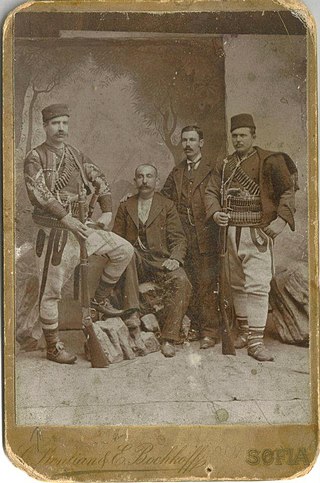
Mirche Atsev, or Mirče Acev, nicknamed Orovchanets, was a Bulgarian revolutionary from Ottoman Macedonia, a leader of an Internal Macedonian-Adrianople Revolutionary Organization (IMARO) revolutionary band.

Gligor Sokolović was one of the supreme commanders of the Serbian Chetnik Movement, that fought the Ottoman Empire, Bulgarian, and Albanian armed bands during the Macedonian Struggle. He was one of the most famous Chetniks, and the foremost in Western Povardarie. In Bulgaria he is considered a Bulgarian renegade who switched sides, i.e. (sic) Serboman.

Metody Patchev was a Bulgarian teacher and revolutionary, vojvoda of the Internal Macedonian-Adrianople Revolutionary Organization. According to the post-WWII Macedonian historiography, he was an ethnic Macedonian.
The Brsjak revolt broke out on 14 October 1880 in the Poreče region of the Monastir Vilayet, led by rebels who sought the liberation of Macedonia from the Ottoman Empire. According to Ottoman sources the goal of the revolt was the accession of Macedonia to Bulgaria. The rebels received secret aid from Principality of Serbia, which had earlier been at war with the Ottoman Empire, until Ottoman and Russian diplomatic intervention in 1881. The Ottoman Gendarmerie succeeded in suppressing the rebellion after a year.
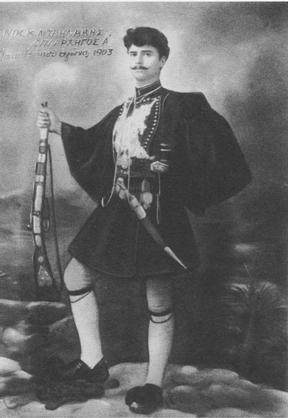
Nikolaos or Lakis Dailakis was a Greek revolutionary of the Greek Struggle for Macedonia.
Lazaros or Lazos Tsamis, was a Greek merchant of Vlach origin, who participated in the Macedonian Struggle and later as volunteer leader in the struggle for Northern Epirus.
The Kumanovo uprising was an uprising organized by an assembly of chiefs of the districts of Kumanovo, Kriva Palanka, and Kratovo in the Vilayet of Kosovo in 1878. The movement sought to liberate the region from the hands of the Ottoman Empire. Following the Serbian Army's liberation of Niš on 12 January 1877, the rebellion began on 20 January 1878 with guerrilla operations during the army's liberation of Vranje. The rebels received secret aid from the Serbian government. The uprising lasted four months until its suppression by the Ottomans on 20 May, during which the Ottomans retaliated with atrocities on the local population.
The Battle of Tabanovce between the Serbian Chetnik Organization, a Serbian rebel faction, and an Ottoman garrison from Kumanovo, took place on 27 March 1905.
Kadino Selo is a village in Municipality of Prilep, North Macedonia. Macedonian-born Bulgarian revolutionary Metody Patchev died here and is buried in the local church.
Spiro Crne was a rebel leader active in Ottoman Macedonia. Born in a village near Prilep, he killed an Ottoman tyrant and fled to Serbia, in the north. In Vranje, he established a rebel band trained and armed by the Serbian military government that was sent into Macedonia.
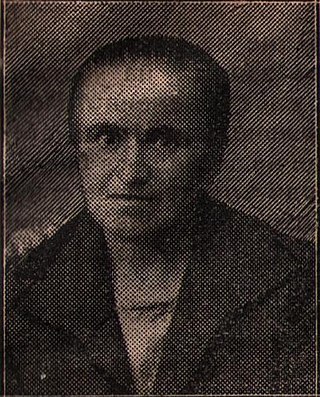
Kostadina Evtimova Boyadzhieva—Rusinska was a Bulgarian teacher, feminist and revolutionary.

The Assumption, also known as the Sunday School or Primary School, was an organisation founded at the end of the nineteenth century in Ohrid. The organisation was founded by women teachers to improve education in Bulgaria. The organisation became notable when it joined with the Internal Macedonian Revolutionary Organization and supported the Ilinden Uprising.
References
- ↑ Freedom or Death, The Life of Gotse Delchev, Mercia MacDermott, 1978, Journeyman Press.